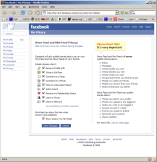 Earlier this week, facebook.com (the MySpace of college students) launched what it called "two cool features," feeds to track friends' online activities:
Earlier this week, facebook.com (the MySpace of college students) launched what it called "two cool features," feeds to track friends' online activities:
News Feed highlights what's happening in your social circles on Facebook. It updates a personalized list of news stories throughout the day, so you'll know when Mark adds Britney Spears to his Favorites or when your crush is single again. Now, whenever you log in, you'll get the latest headlines generated by the activity of your friends and social groups.
To management's apparent surprise, not all users thought these feeds were so cool. Protests were launched, using the feeds to spread their outrage, and users threatened boycotts.
Even though all the information available in "feeds" was information users were already making available to the same set of "friends," feeds felt different. Their tracking of changes from minute to minute, and instantaneous, aggregregate notification must have driven home to users just how much information Facebook had. Now, Facebook has added privacy settings to the feeds, and much of the furor seems already to be dissipating.
It's hard to tell whether this is a victory for "privacy" or not, but we can learn a few lessons from the sequence of events:
This means that when we're trying to give people privacy options in software, it might not be enough just to set a default and let them root around in configuration menus, or even to offer a checkbox. Instead, we should try to offer scenarios to taking people through the consequences of what checking the box means.
Privacy is multifaceted. As a society, we'll need to make social, legal, and technical choices to preserve the privacy that lets us have relationships and communities.
Posted by Wendy at September 08, 2006 12:57 PM | TrackBackAs a current college student who has been following this uproar over the recent Facebook changes I was very surprised at how quickly so many users reacted. I think your suggestion of panic is appropriate; almost immediately I overheard words like "creepy" and "stalker" being used. What is interesting is many of users of Facebook are aware of just how much data is collected and accept this. The cause for panic was not--in my observations--shock or disbelief that so much information was collected and stored; but how trivial the information and the absolute lack of control. I found myself thinking, "Great, now everyone will know when I go back to fix a typo I just noticed". The concern over privacy seems to have become especially salient in this example because these constant refinements we all make to our public personas are intended to be private: when one checks in the mirror for leftover lunch in their teeth, or pauses for a moment to think over what they are about to say, these acts if they aren't private lose their relevance. Users who change details to their Facebook accounts didn't want everyone to know that they were straightening their shirt so to speak, something intended to be private. I applaud Mark Zuckerberg for his quick and appropriate response; however, this incident reminds us all of the need to think critically about what privacy means and whether something is intended to be private.
Posted by: Chelsea on September 8, 2006 07:23 PMThanks for the input. I think privacy as control is another important way of looking at these issues. Love the analogy of "checking the mirror for leftover lunch."
Posted by: Wendy on September 10, 2006 02:16 PMI think the attention span issue is key. I think in this sound bite world people are often astonished at the tenacity and memory of a data collection apparatus when it is turned on them. In a world where the TV reminds us every 13 minutes that House is on at Tuesday at 8 and friend's birthdays go forgotten, it becomes almost as hard to grasp the concept of a persistent surveillance as it is to understand astronomical distances or geologic time.
Posted by: Rob Carlson on September 12, 2006 11:17 AM